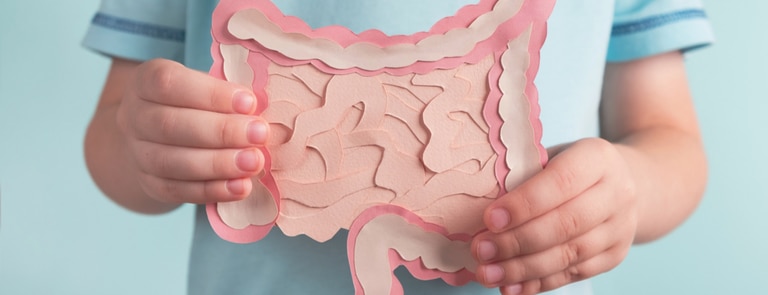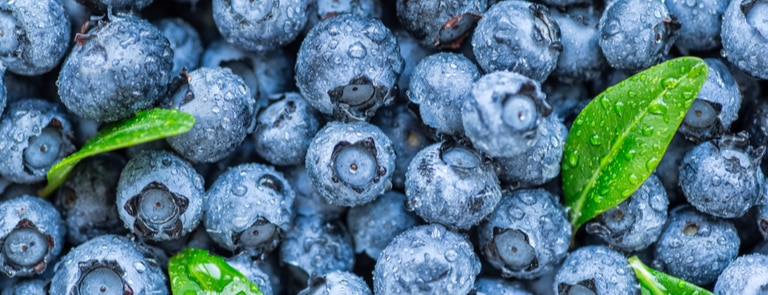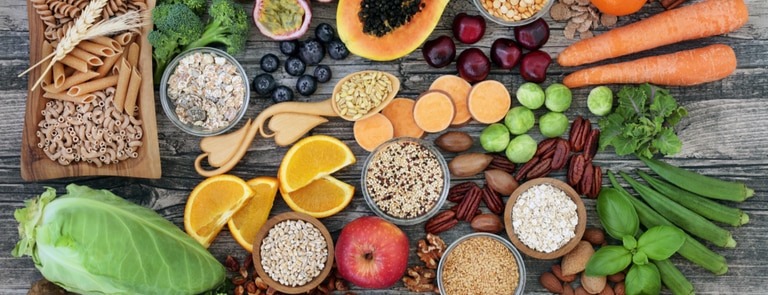Prebiotics guide: foods, benefits & supplements
So, you’ve heard about probiotics, but what about prebiotics?
If you’re unsure how prebiotics compare to probiotics, this article is for you.
Keep reading for everything you need to know about prebiotics, including sources, health benefits, side effects and more.
In this article, we will cover
- What are prebiotics and how do they differ to probiotics?
- Why do we need them?
- 20 of the best prebiotic foods
- Other ways to get prebiotics
- Are prebiotics suitable for everyone?
What are prebiotics and how do they differ to probiotics?
Read on to find out more about prebiotics...
What are prebiotics?
Prebiotics are plant-based fibres that are used to feed your good gut bacteria, enabling it to grow stronger and healthier over time.
These prebiotics are naturally present in certain carbohydrate-rich plant foods (more on these below). They can also be added into food and supplements too.1
Prebiotics can be used alongside probiotics, supporting the chance of your body’s good, or friendly, gut bacteria being able to multiply and thrive in the process.
The more good gut bacteria you have, the less bad bacteria you’re likely to have, which can lead to health issues, including gas, bloating, diarrhoea, stomach cramps; fluctuating moods; migraines; allergies and skin irritation, among many other things.2
Friendly gut bacteria explained
You may not be aware, but there are millions of bacteria living inside your gut. This bacteria is also known as your microbiome or your gut flora.

Prebiotic v probiotic
So, we’ve touched on the fact that there are prebiotics and probiotics, but what’s the difference between them? How do they stack up against one another?
Probiotics are...
Good bacteria that are the same or similar to the bacteria that’s naturally present in your body, and they come from various different types of food.
Collectively, they help create a gut microbiome that’s healthy because they contain lots of health-boosting bacteria, such as acidophilus.
They also proactively work deep down in your gut to stimulate your immune system to help fight off infections.3
Prebiotics are...
Prebiotics provide probiotics (our friendly gut bacteria) with the fuel – mainly carbohydrates and plant fibres – that they need to do their job.
Your body struggles to break down and digest the nutrients that can be found within prebiotic food sources.
But they don’t go to waste. They have a positive impact on your body’s gut microbiome in their own special way – by providing the good gut bacteria for food to live off.
This undigested food travels into your colon, where probiotics ferment it and then use it for energy.1
Interestingly, probiotics are living microorganisms that can be easily killed off by being exposed to stomach acid, heat or decay.
Prebiotics, on the other hand, aren’t actually living organisms. This means they aren’t impacted by any of the heat, decay, cold or acidic conditions they can experience in your gut. This makes them even more valuable for gut health, as they can safely travel through the hostile conditions of your stomach.
An example of this handy talent in action? Foods that are sources of prebiotic fibres don’t lose their nutritional value or taste – regardless of if they’re fresh or frozen.4
Impressive, right?
Summary
- Probiotics are good bacteria that’re naturally present in your body and come from various types of food. They’re living microorganisms
- Prebiotics provide probiotics with the fuel, mainly carbohydrates and plant fibre, they need to do a great job. They aren’t living organisms

Why do we need them – what do they do in the body?
As we’ve just established, prebiotics work hand-in-hand with probiotics to improve your overall gut health.
They do this by increasing the levels of good bacteria that are targeted by probiotics; the benefits of which are reportedly short-lived.
As a result, prebiotics are sometimes combined with probiotics to provide synbiotic therapy.5
Prebiotics are considered to have a beneficial impact on people’s health in several different ways.
It’s important to remember that advice in this article is for information only and should not replace medical care.
Some of the main health benefits include:
-
Constipation relief
Dysbiosis, which is caused by less good gut bacteria and higher levels of bad bacteria and pathogens, can lead to constipation.
Prebiotics are believed to help ease constipation by stimulating the growth of beneficial bacteria, such as bifidobacteria, that can help improve your bowel movements.
Meanwhile, these bacteria produce short-chain fatty acids that play a key role in improving blood flow and mobility in your gut.6
-
Cholesterol levels
The short-chain fatty acids produced by prebiotics may also help reduce cholesterol levels.7
They’re absorbed by your body and metabolised by your liver which, in turn, could help lower blood pressure.8
-
Mineral absorption
Prebiotics improve your body’s ability to absorb vital minerals, such as calcium and magnesium.9,10
Again, it’s those short-chain fatty acids (along with the long-chain ones this time, too) produced by prebiotics that are responsible for this.
They work by acidifying your gut which increases the solubility of minerals that end up there. This leads to an increase in calcium-binding proteins in your intestine.
Specifically, a 12-month study of 100 adolescents who took 8g of short-and long-chain prebiotics a day, showed a significant increase in calcium absorption that led to greater bone mineral density after a year.11
-
Weight loss
A randomised trial was carried out to examine the effects of prebiotic supplementation on body weight in overweight and obese adults.12
48 healthy adults with a body mass index of over 25 were given 21g of oligofructose (a type of prebiotic) a day, or a placebo, for 12 weeks.
Researchers reported a reduction in body weight (ranging from 0.43kg to 1.03kg) in the group that took prebiotic supplements.
In comparison, the control group put on weight during the 12-week experiment.
It was concluded that prebiotics may help improve gut barrier integrity and reduce intestinal low-grade inflammation.
This can help stabilise metabolism while also promoting weight loss. However, more research in this area is needed.
Summary
- Prebiotics work hand-in-hand with probiotics to improve gut health
- They can be combined with probiotics to provide synbiotic therapy or synbiotics
- The health benefits of prebiotics are widespread, ranging from weight loss to maintenance of cholesterol levels and greater mineral absorption
20 of the best prebiotic foods
The good news is that once you know there are certain foods out there that have natural prebiotic properties, lots more choices become available to you.
There are, as it happens, many different prebiotic food sources to choose from, including these:
Prebiotic foods list
- Garlic
- Leafy greens
- Leeks
- Asparagus
- Bananas
- Onions
- Oats
- Barley
- Apples
- Jerusalem artichokes
- Chicory root
- Dandelion greens
- Seaweed
- Walnuts
- Wheat
- Barley
- Cocoa
- Flaxseeds
- Jicama root
- Yacon root13,14
If you’ve already been researching prebiotics, then you’ve probably already encountered prebiotic supplements. These are a quick and easy way to boost your body (and gut).
Keep reading for more details about prebiotic supplements…
However, suppose you do choose to increase your prebiotic uptake via your diet alone. In that case, you’ll also be benefiting from all the wider nutrients, such as polyphenols, that are present within prebiotic food sources.
If the idea of eating more prebiotic-rich food appeals to you, here are six prebiotic food recipes to help you get started:
- Slow-roasted leeks with toasted grains and pesto.
- Tempeh bacon and leek quiche.
- Grilled asparagus and smoked tofu benedict.
- Caramelised onion pasta.
- Mushroom stir fry with garlic, black pepper and chives.
- Rosemary with roasted garlic houmous.15
Summary
- There are lots of prebiotic food sources out there
- They include: garlic, Jerusalem artichokes, onion and leeks
- Prebiotics also contain wider nutrients, such as polyphenols

Other ways to get prebiotics
Prebiotics are also available in supplement form, which may be the ideal option for you if you don’t want to change your diet or simply don’t have the time to think about a new set of recipes.
Most prebiotic supplements contain around 4 to 5g of prebiotics a day.
The guidance around taking prebiotic supplements is that you should start by taking one a day and seeing how your body responds.
If you experience gas or bloating, you may want to reduce the dose to half a tablet a day.
More importantly, make sure you read and follow the manufacturer’s guidance, and don’t exceed the recommended dose.16
The vast majority of prebiotic supplements contain the following prebiotic properties:
- Fructans (inulin and fructooligosaccharides)
- Galacto-oligosaccharides (GOS) – is produced commercially from lactose, which is present in dairy
- Oligofructose (fructose) – which is naturally present in wheat, onions, bananas, garlic and leeks. It can also be extracted from chicory root and manufactured from sucrose
- Lactulose – which is made from lactose17
Are prebiotics suitable for everyone?
Generally speaking, prebiotics are safe for most people, and you can usually take them without any side effects.
However, if you have IBS, then it’s possible prebiotics could make your IBS symptoms worse.18
This is because prebiotic fibres are non-digestible, and they ferment into short-chain fatty acids in your colon.
This fermentation process can increase the likelihood of you experiencing gas, bloating, diarrhea and constipation, especially if you already suffer from these symptoms.
What’s more, if you have Small Intestinal Bacterial Overgrowth (SIBO) or FODMAPs intolerance, it’s recommended you avoid taking prebiotics, as they could aggravate any existing symptoms.
Regardless of whether or not you have IBS, SIBO or a FODMAPs intolerance (or wider health issues), if you’re planning on taking prebiotics, it’s important you speak to your GP or dietitian first.
They’ll be able to advise you on whether or not prebiotics are the right route for you and, if they are, the best form and dosage to take based on your health and individual requirements.
Summary
- If you struggle to get enough prebiotics in your diet, you may consider taking a prebiotic supplement
- Most prebiotic supplements contain around 4 to 5g of prebiotics a day
- They tend to contain one of these prebiotics – fructans, galacto-oligosaccharides, fructose or lactulose
A final few words about prebiotics
Just like probiotics, prebiotics are fundamental to achieving greater gut health.
Contrary to popular belief, they aren’t the same as probiotics, and play their own, equally important role in boosting good gut bacteria levels.
You can easily increase your prebiotic intake, either by making sure your diet contains more prebiotic-rich food, such as apples, barley, oats and leeks, or by taking a prebiotic supplement.
Prebiotics also really come into their own when boosting the effectiveness of probiotics, by providing them with their much-needed fuel.
Overall, they give your good bacteria an even greater chance of growing and thriving, which can lead to widespread positive health effects, such as fewer stomach issues and allergies, as well as reduced cholesterol and obesity issues.
The advice in this article is for information only and should not replace medical care. Please check with your GP or healthcare professional before trying any supplements, treatments or remedies. Food supplements must not be used as a substitute for a varied and balanced diet and a healthy lifestyle.
Sources
- https://www.ncbi.nlm.nih.gov/pmc/articles/PMC6463098/
- https://www.everydayhealth.com/digestive-health/signs-of-unhealthy-gut-and-how-to-fix-it/
- https://www.bda.uk.com/resource/probiotics.html
- https://www.healthshots.com/healthy-eating/nutrition/probiotic-v-s-prebiotic-whats-the-difference-and-which-one-is-better/
- https://pubmed.ncbi.nlm.nih.gov/18461293/
- https://pubmed.ncbi.nlm.nih.gov/32048977/
- https://pubmed.ncbi.nlm.nih.gov/12942586/
- https://journals.lww.com/cmj/Fulltext/2021/10050/Short_chain_fatty_acids_in_blood_pressure,_friend.26.aspx
- https://pubmed.ncbi.nlm.nih.gov/21041813/
- https://pubmed.ncbi.nlm.nih.gov/22394255/
- https://pubmed.ncbi.nlm.nih.gov/16087995/
- https://www.ncbi.nlm.nih.gov/pmc/articles/PMC3827013/
- https://www.eatingwell.com/article/291159/what-are-prebiotics/
- https://www.runnersworld.com/nutrition-weight-loss/a35397168/benefits-of-prebiotics/
- https://www.onegreenplanet.org/natural-health/15-plant-based-prebiotic-recipes-for-healthy-gut/
- https://www.verywellhealth.com/prebiotics-and-ibs-1944748#toc-dosage-and-preparation
- https://patient.info/digestive-health/irritable-bowel-syndrome-leaflet/probiotics-and-prebiotics#nav-1
- https://www.ncbi.nlm.nih.gov/pmc/articles/PMC8233736/